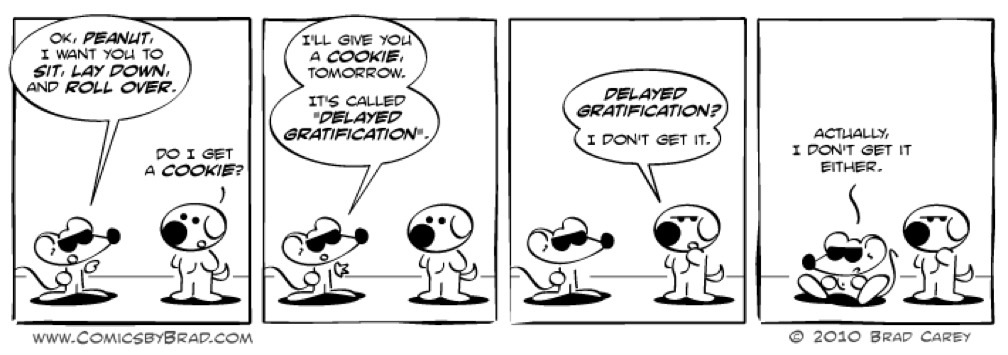Is instant gratification evil? Does working on long term goals need sacrifices such that you need to give up something fun today for a better future? Is working on long term goals a drudgery, which appears boring and monotonous?
The answer to all three questions is NO. You can build a good habit and make it fun and instantly gratifying. In fact, that is the ONLY way to keep up that habit long term. Let’s read on to learn more.
Instant gratification, short term and long term
Let’s start with something that is repeated in habit building quite often. The brain cannot fathom long term benefits or detriments. Rather, the brain is tempted or repelled by something that will happen immediately. Unless you exercise tremendous will power, logical reasoning and deliberate thought, the brain will be motivated by what it knows will happen a few seconds or minutes from now, rather than what happens hours, days, months or years later.

The brain is motivated by the melting texture of cheese rather than the fact that a week of consuming excessive cheese everyday will make you fat. The brain is repelled by the pain, sweat and fatigue that will be caused by a 5-km run, rather than the fact that a month of running 5 km every day will make you fitter and leaner, leaving you with more stamina.
Try as much as you can to convince the brain about long term benefits, but it won’t listen. It focuses on what the activity will lead to right now or in the immediate future. I have talked about how the brain is just a 2-year old child throughout your life, no matter how old you are.
Worse yet, what if things don’t work out in the future? There are hundreds of athletes in every Olympic competition. They give up so much to be in the Olympics, so that they can win. Yet, only three of them win medals and only one of them wins gold. Fact of life. The brain reasons that there is no point in waiting for a future outcome, when the future is uncertain and success is not guaranteed. It will rather take an insignificant, but certain prize now, rather than an important, but uncertain prize later.

But what if we design our desired habits such that the brain actually looks forward to them? What if we can immediately reward habits we want to keep and immediately punish the ones we don’t want to. This is possibly the best way to maintain or eliminate habits.
Designing habits for instant gratification

Food is an experience worth enjoying. Pure pleasure or revulsion hits you the moment food touches your taste buds. No wonder you feel addicted to certain food items despite their unhealthiness and feel repelled by certain healthy options, which don’t excite your taste buds at all, or worse, offend them. The brain picks by immediate taste rather than by long term benefits and drawbacks. So it makes more sense to keep your healthy options tasty. We explain how to in the next paragraph where we provide examples from our life.
Exercise is another habit that puts people off. The drudgery of going for a run or lifting weights is too much hassle for most people to keep up. The benefits of exercise, such as perfectly sculpted triceps and six-pack abs, are too far away and extremely uncertain. It makes sense to keep exercise fun by giving pleasure to your eyes or ears and distracting your brain away from the pain and fatigue.
Watching sports on TV is habit that feels pleasurable instantly, especially if you have a large screen and a sound system with surround sound. But there is nothing to be gained personally from watching others play sports. You should read about it in the post, How to invest 30 days in yourself. What are the small things that make watching sports fun? Which of those can you use in activities that usually bore you? Scorecards? Competition? Running commentary? Action replay? Suspense? Be creative and gamify your everyday activities, e.g. cleaning the house, so that they feel more fun.
What works for us
Priya has talked about temptation bundling, a practice that entitles you to a fun activity along with a boring activity. The catch is that the fun activity is allowed ONLY with the boring activity. E.g. listening to podcasts only in gym or while cleaning the house, having chips only as a side along with rice in our lunch, shopping for snacks ONLY during our weekly grocery shopping. This limits the number of times we indulge in detrimental habits. It also make us look forward to the beneficial habits that are otherwise boring.
There are several food habits that are considered beneficial: no frying, no caffeine, no garlic, no masala, etc. I feel that too many ‘NO’s take the fun out of food and make it nearly impossible to stick to healthy habits. Instead, I like to replace the word ‘no’ with ‘low’ or ‘less’, e.g. low fry, less salt, less masala, etc.

How low or less should we go? Instead of having coffee multiple times a day, Priya and I have coffee only once a day after breakfast, after having completed the gym. We NEVER give up on that cup. It makes us look forward to gym and then breakfast, after which we sit with our coffee in pure bliss, knowing that the entire morning is worth it 🙂 .
We have reduced ingredients like oil, garlic, chilly, onion and other tasty stimulants in our meals, by reducing the quantity a little everyday. In the end, we found a combination that works for us. Reducing the stimulants further led to inferior tasting food, so we stopped at a minimum. Instead of frying patties in a wok full of oil, we shallow fry them on a pan in two tablespoons of oil. We add just half or one teaspoon of salt and one tablespoon of home-made onion-garlic paste to gravies. We tried zero-oil baked patties and gravy without onion and garlic. Both didn’t satisfy our taste buds. So we are sticking to shallow frying and the tablespoon of garlic and onion.
I find running on treadmills and using stationary bikes totally boring. Instead, when I run outdoors or use a real bicycle, I easily work out more kilometres. These days I finish my cardio workout outdoors and then head to the gym for only the weights. Running early in the morning in a quiet neighbourhood with plenty of trees, the sunrise and a view of a nearby river is rewarding. It is much more motivating than cranking out featureless kilometres on a treadmill. Running and bicycling are especially more rewarding if either the route itself goes through or the end of the route leads to places of natural beauty, like a hill top, a forest, a waterfall, lake or river side or a beach. Make your workouts more fun. You deserve it.

Scorecards and milestone rewards
Another way to make things fun is to keep a scorecard and to reward yourself for milestones. Achievements and celebrations make you look forward to keeping your habits. Priya and I spend 15 minutes in the sauna of our apartment’s health club if we complete an entire week’s workout plan without fail (4 days of gym and 2 days of swimming). A month of keeping our workout plan intact gives us more treats, e.g. a day at a gaming arcade at one of our city’s malls.

When you link rewards with keeping up habits and treat yourself in proportion to your habit streak, you will definitely be super-motivated to continue.
Conclusion
For every habit you perform, your brain asks the question, “What’s in it for me immediately if I agree with you?” If the brain doesn’t get a satisfactory or a tempting answer, it shirks. So make sure you answer this question so effectively that your brain looks forward to continuing the habit without fail. Build a lot of effective habits, but make them fun and make them instantly rewarding.

Bribing the little kid into compliance 😛
Yes, adults are just overgrown kids 🙂